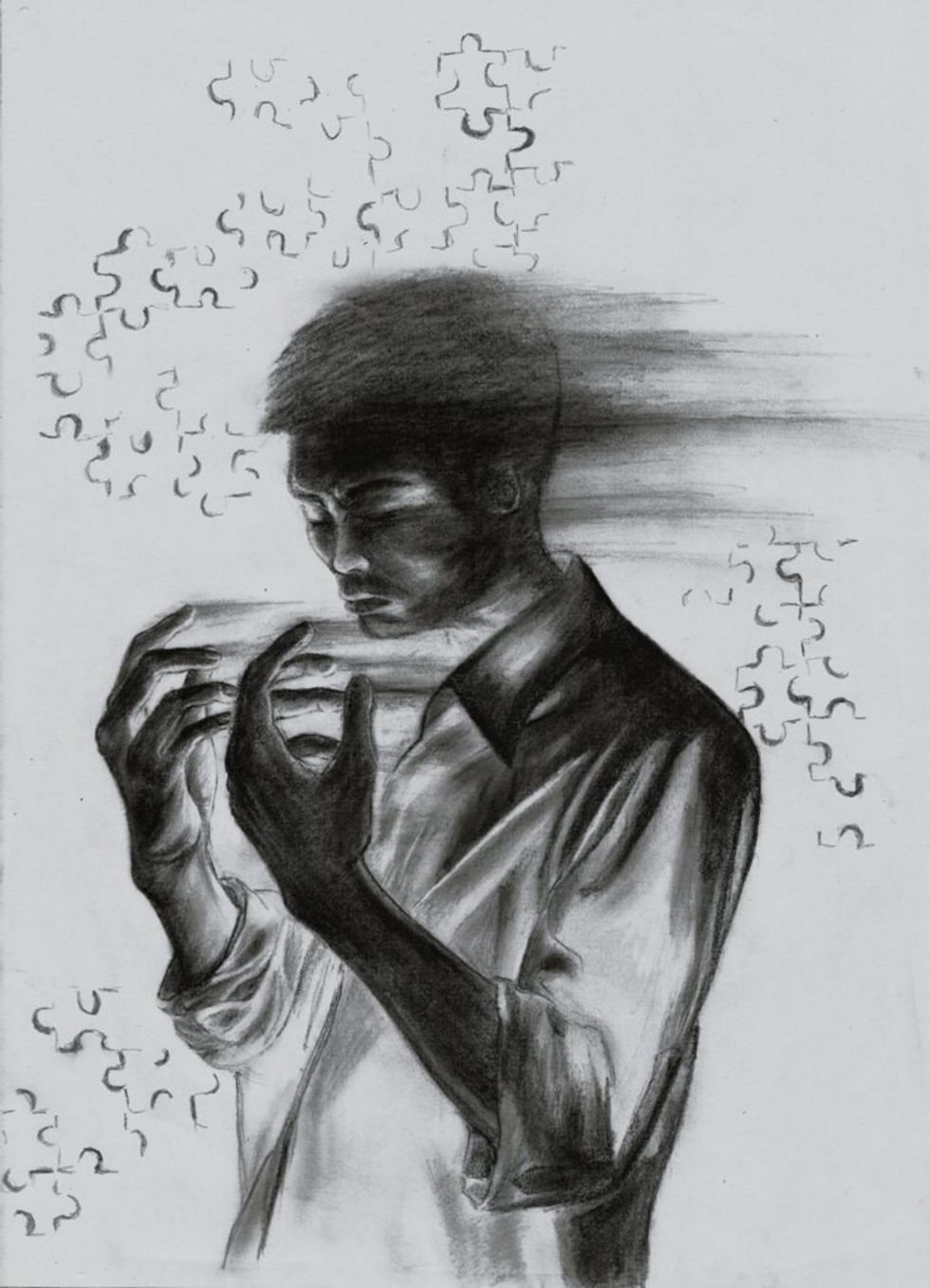Straddling between concept album and music that is “listenable” makes for a difficult task, regardless of the band. A “concept album” is a collection of songs that coagulate to expand on an idea bigger than the individual songs. In society, this would be the musical equivalent of a group of people coming together to lay the groundwork for a company by listing the mission statement, or a philosopher formulating his magnum opus.
Over the years, certain bands have become synonymous with the term ‘concept album.’ For my money, the first concept album was John Coltrane’s “A Love Supreme,” which Coltrane used as a vehicle to thank God for bestowing musical talent upon him. In fact, the entire album is a microcosm of the Christian walk, whether it depicts joy, sadness, angst, or fear. Coltrane’s album, however, isn’t as famous as The Who’s “Tommy,” The Beatles’ “Sergeant Pepper’s Lonely Hearts Club Band,” and others.
It would, however, be difficult to name a band more identified with “concept albums” than Pink Floyd, who arguably never released any non-concept-albums. Some of their albums were more political in nature (“Atom Heart Mother”), some were straight-up stories of loneliness and anti-socialness (“The Wall”), some were anti-war albums (“The Final Cut”) and one was even a kind of love letter to a past band member (“Wish You Were Here”). Pink Floyd in its prime was, in a sense, a musical Socrates; they were a band that never played things straight and rebelled against the industry norms. Their most powerful work and seminal achievement, however, was “Dark Side of the Moon,” which is the most ambitious concept album they ever released.
Every musician dreams of transcending space, time, and thought with their music. Bach sought to do this by offering it as a sacrifice to God, putting SDG at the end of each of his works. SDG stands for “Soli Deo Gloria,” which was a Reformation-era mantra meaning “to the glory of God alone.” Beethoven sought to do this by, well, actually doing it. Liszt created “symphonic poems” to express his thoughts on everything from Victor Hugo to Dante’s Inferno to Faust to a painting by Wilhelm von Kaulbach.
Wagner may have been the most ambitious, even going as far to state that his music, if played exactly as he envisioned it, would be utterly devastating. Having listened to Wagner’s music played imperfectly, I agree with his assessment. Wagner, in fact, is the direct ancestor to Pink Floyd. That, however, is a different article for a different time.
After Wagner, Mahler made the bold statement that “a symphony contains the whole world,” and promptly wrote nine and a half world-containing symphonies (including his eighth, which is a musical re-telling of Faust). This was followed by poems and music such as Auden’s and Bernstein’s respective and distinct versions of “The Age of Anxiety,” which was more or less a symphonic poem describing the current generation. Less than 20 years later, we get Coltrane, and less than 20 years after that comes “Dark Side of the Moon.”
Now, one can study “Dark Side of the Moon” in two different ways: musically or lyrically. Like a good Wagnerian, the two are more or less inseparable, except that this particular album has a large number of recurring themes and songs where the musical themes all meld together (“Eclipse,” the final track on the album is like this, and so is “Time”). As is the case with most good concept albums, the music says more than the words. For the purposes of this article, however, we’ll stick with the lyrics.
One of the album’s main themes is mortality. Specifically, “Dark Side of the Moon” deals with mortality as the great neutralizer of life’s meaning. The first track on the album is an instrumental with some background voices talking about craziness -- those who try to find meaning in their lives are considered crazy. The first track with lyrics is “Breathe,” which is probably the most common musical theme in the album.
Here are the first two stanzas:
"Breathe, breathe in the air.
Don't be afraid to care.
Leave but don't leave me.
Look around and choose your own ground.
Long you live and high you fly
And smiles you'll give and tears you'll cry
And all you touch and all you see
Is all your life will ever be."
Right off the bat, we have an existentialist statement. Experience life, the musician says, because everything you feel and touch and see is everything in the world. This is an important lyrical theme that comes back into play later. Continuing with the song lyrics:
"Run, rabbit run.
Dig that hole, forget the sun,
And when at last the work is done
Don't sit down it's time to dig another one.
For long you live and high you fly
But only if you ride the tide
And balanced on the biggest wave
You race towards an early grave."
Apparently, nullifying the worth and practicality of believing in an afterlife wasn’t enough, because David Gilmour follows this by saying that the life we experience is terrible. We work and work and work, but what do we work for? We live, we experience the highs and lows of life, and after years and years of work, we die. It’s a happy story, isn’t it? Oh, but it gets so much happier.
“On the Run” is another instrumental, with a woman voicing over, saying, “Live for today, gone tomorrow; that’s me!” followed by a maniacal laugh. Pink Floyd is a big fan of that maniacal laugh, and it shows up in multiple places. The third track, however, splits “Breathe” and “Time.” The latter track, of course, transitions right back into “Breathe” towards the end.
“Time” repeats “Breathe” in idea, expanding upon its predecessor by going into more depth with stanzas like:
"So you run and you run to catch up with the sun but it's sinking
Racing around to come up behind you again.
The sun is the same in a relative way but you're older,
Shorter of breath and one day closer to death."
There’s a famous line in Richard Linklater’s masterpiece “Dazed and Confused,” where Matthew McConaughey jokingly tells one of the boys, “The older I get, the more these girls stay the same age.” This is what could be called the bright side of existentialism. Pink Floyd’s line in “Time” is basically the same principle: nothing ever changes except for “person.”
Asian (particularly Korean) filmmaking is unique because it wears its classical religion on its sleeve. One of the primary principles of Buddhism is that the world cannot influence the individual. What is important is not the events of life, but how we interact with them. It’s a setting aside of the external to focus on the internal (very similar to Covey’s first habit in 7 Habits of Highly Effective People).
Existentialism prescribes a similar outlook on life. The difference is that Buddhism exists to help the individual conquer the external. Existentialism teaches that the individual has already been conquered by the external, that there’s too much external to bother conquering. So, we focus on the little thing in our life and realize that the external doesn’t matter because worrying leads to a life of malaise.
In the above stanza, the band is telling us this exact thing. We float through time on a spinning axis. The world around us never ages or changes, but we do. Man lives and dies. So, the song asks, why do we even bother trying to fight time? Hector Berlioz had a very postmodern statement when he said, “Time is a great teacher; unfortunately, it kills all of its pupils.” In a sense, that’s what the writers behind Pink Floyd want to tell us; except they aren’t saying that time is any kind of teacher at all.
The next two major tracks in the album, “Money” then “Us and Them,” change tact slightly. Whereas “Time” and “Breathe” told us of the worthlessness of life, these two tracks tell us the futility of certain life-meanings. “Money,” of course, talks about the real worthlessness of money, while “Us and Them” talks about the asininity of war, which takes a bunch of normal blokes and hurls them at each other in jagged lines. It’s Catch-22 or any of the great war satires.
These two songs are followed by “Brain Damage,” which is probably the most famous song on the album, and probably the most complex psychologically. I could write a whole article on interpreting this one song, since the wordsmith layers the emotions so delicately. For time’s sake, however, I’m going to spoil the fun:
"The lunatic is on the grass.
The lunatic is on the grass.
Remembering games and daisy chains and laughs.
Got to keep the loonies on the path.
The lunatic is in the hall.
The lunatics are in my hall.
The paper holds their folded faces to the floor
And every day the paper boy brings more."
Let’s take a quick look at the people he is describing. In the first stanza, he’s referencing people that are, physically, somewhat at a distance. Then he lists the things they do: play games, make daisy chains or wreaths, and laugh. To me, it sounds a lot like he’s talking about children. This makes even more sense when he says that they ought to keep the loonies on the path, which can reference keeping them on a literal sidewalk, or keeping them from becoming crazy (of course, we’ve already established earlier that the album’s definition of a crazy person includes anyone with a purpose in life).
The second stanza moves the physical location even closer, but makes even more transcendental statements about fellow man. “The paper holds their folded faces to the floor,” makes it straightforward whom he’s talking about. But it’s even more than that. Yes, the paper talks about criminals, politicians (a favorite type of person to hate upon), sports teams, ads, and even lottery winners. The paper, however, seems to be symbolic of humanity in general. After all, politicians are faceless names and criminals are nameless faces. In theory, these societal roles could belong to anyone with either a name or a face.
The realization that virtually anyone can be a lunatic in the album’s logic leads the author to one final conclusion:
"The lunatic is in my head.
The lunatic is in my head.
You raise the blade, you make the change
You re-arrange me 'til I'm sane.
You lock the door
And throw away the key
There's someone in my head but it's not me."
Lunacy is like a disease that one catches from being too self-aware. The author hasn’t changed so much throughout the course of the song; he simply became aware of his own disease -- one that is impossible to escape. No man, as John Donne says, is an island from society. No one can live a life free of goals and desires, whether those goals be short or long term. A man may convince himself that he has achieved total freedom, only to find that he’s still tethered to himself and the things he wants.
This realization sets up the final lines in the most powerful section of the entire album, Eclipse. Summarizing bits of it cannot possibly do it justice, so here is the entire thing:
"All that you touch
All that you see
All that you taste
All you feel.
All that you love
All that you hate
All you distrust
All you save.
All that you give
All that you deal
All that you buy,
beg, borrow or steal.
All you create
All you destroy
All that you do
All that you say.
All that you eat
And everyone you meet
All that you slight
And everyone you fight.
All that is now
All that is gone
All that's to come
and everything under the sun is in tune
but the sun is eclipsed by the moon."
As someone who does not share an existentialist philosophy, it confuses me as to why the culture has let such a subversive statement go unchecked for so long. This is an album that has gone platinum many times over, and these are lines that have aired on the radio millions of times in hundreds of different places.
The first 24 lines of the song summarize literally everything in the world, and, more relevantly, everything that the prior songs on the album have discussed, getting more and more vague and principled as time goes on. Then the band pulls the rug out from under their listeners: everything under the sun is in tune, but the sun is eclipsed by the moon. This lunar eclipse casts a worldwide shadow over everything in the world. It’s only then that we realize that the dark side of the moon, the album’s namesake, is derived from the very image the lyricist uses to nullify the worth of everything.
If everything were still under the sun, it should be in tune. But it’s not anymore, not according to this album. It’s under the moon, specifically the dark side. Can there be a more accurate image for modern intellectuality? We don’t play by established rules anymore. For centuries, man believed that God controlled the universe, but now it’s accepted that chaos-bred evolution is a viable alternative. Until the 20th century, society recognized two genders and one type of sexuality (that being heterosexuality). Today, the culture has eschewed historical norms in favor of more chaotic individuality.
Nothing, Pink Floyd’s album tells us, is in tune anymore. What was once considered moral enlightenment has been covered in shadow. And if the culture has given us any indication, they believe themselves better off that way. Next week, we will take a look at how to counteract existential malaise.





















